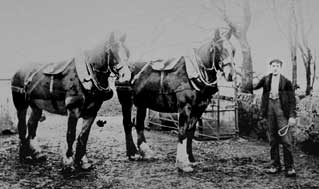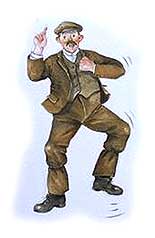Bothy Ballads
Bothy Ballads by Greg Dawson Allen
"...true popular ballads are the spontaneous products of nature..."
Francis
James Child

A Buchan Horseman with Clydesdale Working Pair, c1930
Nowhere else in the western world possesses such a fine tradition of balladry and folk song as does the north east of Scotland and in particular a small tract of countryside in Aberdeenshire called Buchan.
This agricultural heartland has long been recognised for its music and song. Prof. Francis James Child (Boston, Mass. 1825 - 1896) who, when compiling his famous "English and Scottish Popular Ballads" collection, made reference that out of the 305 ballads given to him, 91 were from Aberdeenshire.
In the north east there are two distinct types of ballads. The first, the popular ballad or ‘muckle sang’, can further be sub-divided into two categories; the historical ballads which relate actual events such as ‘The Fire Of Frendraught’ (1630), and ‘The Battle Of Harlaw’ (1411), and, the romantic ballads often telling of true love and its erratic path; songs of deceit - ‘I Aince Hid A Lass’, and tragedy - ‘The Mill 0’ Tifty’s Annie’, sometimes known as ‘Andrew Lammie’, (Annie died in Fyvie in 1673). The forementioned song titles are but random examples from a vast collection.
The second type, born and bred in Aberdeenshire, is the "cornkister" or "bothy ballad". Like their ‘muckle’ counterparts the bothy ballads refer to romance and love, expose injustice, recount real events but specifically have grown and been nurtured from the experiences of the men and women working in and around the farms or fairmtouns of the 19th and 20th centuries.
The bothy ballads were composed, (not necessarily written down initially), and set largely to existing pipe and fiddle tunes by the men and less frequently the women hired or fee’d for a six month period at the local hiring fairs or fee’ing markets held in towns and villages a week or so before the beginning of the terms; Whitsunday (28th May) and Martinmas (28th November).
"T’was in the merry month of May
When flowers had clad the landscape gay
To Ellon fair I bent my way
With hopes to find amusement.
A scrankie chiel to me cam near
And quickly he began to spier
If I wid for the neist half year
Engage to be his servant.
I’ll need you as my orra loon
Four poun’ ten I will lay doon
To you, when Martinmas comes roon
To close out your engagement."
(Extract from; ‘Ellon Fair’. From ‘The Greig - Duncan Folk Song Collection. Song 353. Published; Aberdeen University Press, 1987. Volume 3.)
Now soon to be unemployed the prospective employees were vulnerable for want of a fee or wage and at the mercy of unscrupulous farmers, and there were more than a few, eager to exploit them. Such employers became the but of many of the songs;
"Assist me all ye muses for to compose a song
‘Tis of a tyrant farmer near Gartly did belong.
An’ while we were his servants oft times to us he said,
Come drive them on some smarter, ye’re now on Bogieside."
(Extract from; ‘Ye’re Now On Bogieside’. From ‘The Greig - Duncan Folk Song Collection. Song 359. Published; Aberdeen University Press, 1987. Volume 3.)
"Come all ye jolly ploughboys, that whistle through the glen,
Beware on going to Swaggers, for he’ll be at Porter Fair.
He’ll be aye lauch lauchin’, he’ll aye be lauchin’ here,
An’ he’ll hae on the blithest face, in a’ Porter Fair.
"Wi’ fine horse and harness, sae sair he’ll gar ye true,
Bit fin ye come to Auchterless, sae sair’s he’ll gar ye rue.
He’ll be aye fret frettin’, he’ll be aye frettin’ there,
He’ll tell you his regulations, they’re growin’ unco
bare."
(Extract from; ‘Swaggers’. From ‘The Greig - Duncan Folk Song Collection. Song 386. Published; Aberdeen University Press, 1987. Volume 3.)
NOTE: James Hay, alias ‘Swaggers’, was the farmer at Newmill near Auchterless in Aberdeenshire.
With the fairs being bi-annual their lively atmosphere were topics for the balladeer fondly remembering courting the lassies or a few jugs of ale with his friends. Sometimes, only sometimes, celebrating having secured a good fee on a respected farm. More often than not the songs targeted the banter between farmer and worker, the former being somewhat economical with the truth;
"As I cam’ in by Netherdale,
At Turra market for to fee,
I fell in wi’ a farmer chiel
Frae the Barnyards o’ Delgaty.
"He promised me the ae best pair
I ever set my e’en upon;
When I gaed hame to Barnyards
There was naething there but skin and bone."
(Extract from ‘The Barnyards 0’ Delgaty’. From ‘Ord’s Bothy Songs And Ballads’. First published 1930.)
Once the fee was agreed the ploughman, cattleman or orra-man (a jack-of-all-trades) and his junior namesake, the orra-loon, usually a lad of good character, hoisted their wooden kists or chests containing their worldly possessions onto the carts and trundled the roads to the farms and home for a six months or longer if the farmer decided to keep him on for a second fee.
The women to were similarly appointed to work in the large kitchens cooking for the family and latterly for the bothy lads. These kitchie-deems (dames) were kept at work under the strict supervision of the farmer’s wife and shared a room in the house never far from her watchful eye;
"Twas at a certain fairm toun,
By winding Deveron’s pleasant border,
An auld wife ca’d Mrs Greig
Her servant girlies kept in order.
At nicht when the women gaed to their beds,
Their sleeping- place she searched over,
For fear some fellow there may hide,
And in among them prove a rover.’’
(Extract from; ‘Mrs Greig Of Sandlaw’. From ‘The Greig - Duncan Folk Song Collection. Song 316. Published; Aberdeen University Press, 1983. Volume 2.)
NOTE: The reputed ‘Mrs Greig’ was Isabella, the wife of Alexander Greig who farmed ‘South Sandlaw', in the parish of Alvah, Banffshire from approximately 1840 to 1870. The author was reputedly a man called Shaw.
Home for the unmarried worker was in a chaumer or bothy but conditions, especially during the 19th century left a lot to be desired and were often inferior to the byres and stables which housed the cattle and Clydesdale horses - these were the valuable assets of the farmer, the crew were expendable unless, of course, you were a skilled horseman and therefore not to be taken for granted particularly when open for public scrutiny at the regular ploughing matches. The horseman’s love for his companions rarely was in question;
"Ah, Smiler lad, my trusty frien’,
It’s guid my pairt to keep ye clean,
Yer marrow yet I hinna seen
Amon’ them a’,
Yon coast-side lads wad something gien
We’dhauden awa’.
Syne when the wark was a’ inspeckit,
And ne’er a faut nor flaw negleckit,
‘Mong sixty ploos we werena bleckit; (beaten)
Though laith to yield,
At length they owned that naething like it
Was on the field.
And noo yer bed I weel may mak’ it,
Stan’ owre a bit and lat me shak’ it;
Your sta’ wi’ hay I hae weel happit,
And bait as weel;
For faith I think ye weel deserve it
For deem’ sae weel."
(Extract from; ‘Ah, Smiler Lad’. From ‘The Greig - Duncan Folk Song Collection. Song 425. Published; Aberdeen University Press, 1987. Volume 3.)
NOTE: The said ploughing match which ‘Smiler Lad’ won was held at Tyrie Mains near Strichen about 1812. The ploughman came from Rora.
One James Taylor receiving his first fee in 1863 and writing of his experiences in 1879 recalls ‘an ordinarily’ good bothy;
"The bothy is an old dirty-looking thatched house, joined on to the end of a cow byre and scarcely one yard from the door there is a large dung-hill an empty dark, filthy, sooty place.
"At the end of the house is the fire-place, about which there is generally a large heap of ashes - at times more than two barrowfuls. In the front side of the house is a window, below which there is an old table; and at the end of it a press fastened to the wall for holding the milk pails. The bothy is very often in a terrible state of filth."
(‘Eleven Years At Farm work’. James Taylor. Published Aberdeen 1879.)
Conditions in later decades became mildly improved but could never be described as adequate. In some places it was the practice to employ an elderly woman - a bothy-wife, to light the bothy fire and occasionally sweep out the floor. Despite this the bothies were places of great fun and amusement.
It was from this lifestyle of the farm worker that the bothy ballads, pertaining to their occupation, were conceived. They were more than songs but social commentaries about rural life, sung from the heart with the pain and pleasure of first hand experience.
Jimmy MacBeath (1874 - 1972) one of the great source singers of the north east was fee’d to a farmer in Banffshire in 1907 at the age of 13 for a £4 fee. Jimmy was on the receiving end of a beating with the back chain of a cart for not controlling the horse properly. His rendition of ‘Drumdelgie’ was sung with a feeling only those who have felt the receiving end of a farmer’s cruelty can truly understand.
"Come all ye servants far and near
Come listen unto me,
An’ I’ll sing you Drumdelgie
Wi’ muckle mirth and glee.
The maister o’ yon muckle toon
He is baith hard and sair,
The cauldest day that ever blaws
His servants have their share."
(Extract from; ‘Drumdelgie’ also known as ‘The Hash 0’ Drumdelgie’. From ‘The Greig - Duncan Folk Song Collection. Song 384. Published; Aberdeen University Press, 1987. Volume 3.)
Other examples of the iron rule of the farmers describe ‘hashing’ or
forcing the crew to work extraordinarily long and laborious hours with
rest only being given to the horses and virtually none to the men.
 The
tradition is kept alive today by singers who compete for cups and trophies
at farm shows and gatherings.
The
tradition is kept alive today by singers who compete for cups and trophies
at farm shows and gatherings.
"The Bothy Balladeer" DS
![]() "Diddling" So what
happened if the band didn't turn up at a country dance? Retired farmer
and Bothy Ballad King Gordon Easton explains the old art of "diddling."
"Diddling" So what
happened if the band didn't turn up at a country dance? Retired farmer
and Bothy Ballad King Gordon Easton explains the old art of "diddling."

